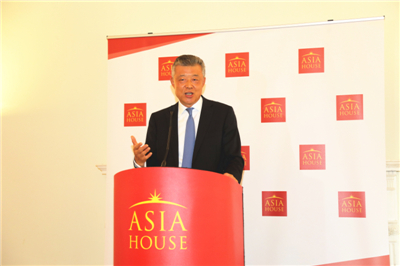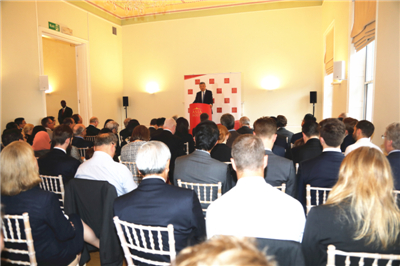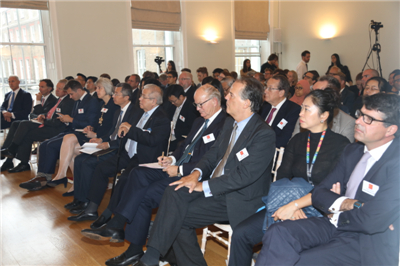|

Lord Green,
Your Excellencies,
Members of Asia House,
Distinguished Guests,
Ladies and Gentlemen:
Good morning!
Thank you, Lord Green, for your kind introduction.
I am not a stranger here at Asia House. It has always been a pleasure to come here to share my views on major issues of common interest. And every visit to Asia House gives me new inspirations and new thoughts.
The world is undergoing profound changes unseen in a century. Changes are punctuated by chaos. Boundaries between populism and nationalism are blurred. Amid surging anti-globalisation and rising unilateralism, globalisation and multilateralism suffer backlashes. These developments are raising questions about where the world is going.
Just as President Xi Jinping asked in his speech at the UN Office in Geneva in 2017, "What has happened to the world? How should we respond?"
For me, as Chinese Ambassador to the UK, I have another important question before me, that is, how to enhance China-UK cooperation in responding to global challenges?
Today I would like to share with you my views on these three questions.
The first question: What has happened to the world?
In my view, the world is facing three main challenges.
The first challenge is the development deficit.
The world economy is under mounting downward pressure and showing further uncertainties and instabilities. On top of that, the escalating trade friction triggered by a certain country is dealing a severe blow.
IMF has downgraded the outlook for world economic growth to 3.2%, the lowest since the outbreak of the financial crisis in 2008. WTO prediction for this year's trade growth is only 2.6%, even lower than the outlook for world economic growth.
It is true that the new round of scientific and technological revolution have resulted in higher economic efficiency. But it has also widened the gap between returns on capital, technology and labour, and it has exacerbated the "digital divide". For many families, the basic necessities of life, such as food, shelter and jobs, are still out of reach.
Cutting the global development deficit remains a daunting task.
The second challenge is the global governance deficit.
In the past century, mankind suffered the scourges of two world wars and endured the dark clouds of the Cold War before establishing a relatively stable international system. Peace has not come easy. It is all the more important that the current international order be cherished.
However, stability and certainty have become "scare commodities" today. Surging protectionism and bullying behaviour are dealing a heavy blow on international rules and multilateral mechanisms, and undermining the trust and cooperation between countries of the world.
The current international order and governance system are not perfect. They need to be more representative and inclusive in order to give more representation and greater voices to emerging economies and developing countries. This is a serious global governance deficit. Reform and improvement are badly needed to bring down this deficit. Every country must be involved in the decision-making process of such reform, including how it should be carried out and what will be the goals.
Cutting the global governance deficit remains a thorny issue.
The third challenge is peace deficit.
With incessant regional conflicts and wars, rampant terrorism and extremism, and surging hot-spot issues, the world is far from a peaceful and tranquil place.
According to the Stockholm International Peace Research Institute, the overall global military expenditure was $1822 billion in 2018, which was an increase of 2.6% over the previous year and the highest since the end of the Cold War.
Moreover, non-traditional threats to security are mounting. Climate change, cyber security and the refugee crisis not only have an impact on our daily life and on regional and global stability. They also have a bearing on the destiny and future of all mankind.
So, cutting the peace deficit also remains a challenging work for all.
Now let me turn to the second question: How should we respond to these challenges?
Here is China's clear-cut answer: China will always be a contributor to global development, an upholder of international order and a defender of world peace.
First, China provides confidence and impetus for world economy.
In a few days, China will celebrate the 70th anniversary of the founding of the People's Republic. In the past 70 years, China has grown from an impoverished country to the second largest economy in the world.
Since 2006, China has contributed around 30% of growth globally. It is now the world's most important economic powerhouse.
China remains one of the fastest-growing major economies in the world. In the first half of this year, China's economy grew by 6.3% year-on-year, which is well within the anticipated range.
Foreign trade and foreign investment in China have kept increasing. From January to August, import and export reached $2.95 trillion, increasing by 3.6% year-on-year. There were 27,704 newly-set-up foreign businesses, and the actual paid-in foreign investment totaled about $89.26 billion, up by 6.9% year-on-year.
China remains determined and confident in deepening reform and opening its market wider to the world.
China has promoted the building of the Belt and Road Initiative (BRI). It has signed agreements on BRI cooperation with 166 countries and international organisations. BRI is now the most popular public goods and largest cooperation platform in the world.
China is improving its business environment by
-
deepening reforms on individual income tax and VAT,
-
cutting tax and lower fees,
-
stepping up IPR protection,
-
and formulating the supporting regulations of the Foreign Investment Law.
China is also taking new measures to open wider to the world, including:
-
adopting a new negative list for foreign investment,
-
establishing the Shenzhen pilot demonstration area of socialism with Chinese characteristics.
-
building the new Lingang area of the Shanghai free trade zone.
-
and setting up six free trade pilot zones in Shandong, Jiangsu, Guangxi, Hebei, Yunnan and Heilongjiang.
China has
-
a population of close to 1.4 billion,
-
labour forces of 900 million,
-
middle-income earners of more than 400 million,
-
market entities of more than 100 million,
-
and a well-educated and skilled talent pool of 170 million people.
No matter how things may change in the world, China has confidence in the resilience, the potential and the prospects of its economy. China will focus firmly on managing its own affairs well. At the same time, China will continue to integrate with the world, promote world development through its own development, and deliver more benefits to the people of all countries.
Second, China contributes to the stability and justice of the international order.
China is one of the founding members of the United Nations. It is a creator, beneficiary and defender of the international order established after the Second World War. China remains firm in upholding the international system with the UN as its core, the international order based on international law, and the multilateral trade system with the WTO as its core.
China has taken an active part in the reform and development of the global governance system. It has joined almost all the major inter-governmental international organisations and signed more than 300 international conventions.
China had been shut out of the UN for 22 years but never wavered in its belief in multilateralism. China had spent 15 years in negotiations to resume its contracting party status to the General Agreement on Tariffs and Trade and to join the WTO. Despite all the difficulties and prices, China has lived up to its WTO commitments fully, and integrated steadfastly with the international order and multilateral mechanisms. China is now the second largest contributor to the UN regular budget, accounting for 12% of the total amount.
As the largest developing country, China upholds justice and fairness in the world, safeguards the common interests of all developing countries, and supports the efforts of other developing countries to raise their voices and increase their influence in the world.
In recent years, as China approaches centre stage in world affairs, the interest in China from the rest of the world has increased exponentially. There are worries that China will challenge the current world order and "reinvent the wheel". There are also talks about a "new Cold War" between China and the US, and predictions that China will fall into the "Thucydides Trap". But these are all needless worries due to misunderstandings.
In our view, global governance should follow the principle of extensive consultation, joint contribution and shared benefits. China opposes the outdated logic that "winner takes all" or "strength leads to hegemony". China is not aimed at challenging or replacing any country. It is committed to a new path of state-to-state relations that values dialogue above confrontation, partnership above alliance.
China should not be blamed for the difficulties in China-US relations in the past two years. We believe that China-US relationship is completely different from the US-Soviet Union relationship during the Cold War. The so-called "decoupling" is not in line with the trend of the times. Nor does it tally with the fact that the interests of the two countries are deeply intertwined. China does not want conflicts or confrontations with the US. China will continue to pursue a China-US relationship that is based on coordination, cooperation and stability.

Third, China shoulders its responsibility for and contributes its wisdom to world peace.
China is committed to the path of peaceful development, and promotes world peace through its development. At the same time, China advocates that all countries should follow the path of peaceful development.
Over the past 70 years, China has never launched a single war or conflict. China follows a defense policy that is defensive in nature. It is the only nuclear power in the world to have promised no first use of nuclear weapons.
Of the five permanent members of the UN Security Council, China has the lowest level of military expenditure both as percentage of GDP and in per capita terms. Its per capita military spending is only one eighteenth of the US and one ninth of the UK.
China is also the second largest contributor to the UN peacekeeping budget and the largest contributor of peacekeeping personnel among the P5. Some 39,000 Chinese peacekeepers are serving in peacekeeping missions all over the world. In the Gulf of Aden and off the Coast of Somalia, Chinese navy has carried out escort missions for ten consecutive years and ensured the safe passage of more than 6,000 ships.
China advocates a new concept of common, comprehensive, cooperative and sustainable security. This is a concept that embodies China's wisdom. Following this concept, China has engaged in the political settlement for regional hotspot issues in a responsible manner. On the Iran nuclear issue, China upholds and implements the Joint Comprehensive Plan of Action. On issue of the Korean Peninsula, China upholds peace and stability by promoting the momentum for dialogue and the easing of tension.
China has also made positive contribution to the international efforts in addressing non-traditional threats to security. Take climate change for example:
-
China firmly supports the Paris Agreement on climate change and calls for green development. By 2017, it had fulfilled its promise of cutting carbon emissions per unit of GDP by 40-50 percent compared with 2005. This means target met three years in advance.
-
China has also been the world's largest investor in renewable energy in the past ten years.
-
Moreover, China has set up a South-South Climate Cooperation Fund and injected 20 billion RMB yuan to help other developing countries tackle climate change.
Now I would like to turn to the third question: What should we do to enhance China-UK cooperation in responding to global challenges?
China-UK cooperation is mutually beneficial and enjoys promising prospects.
This year marks the 65th anniversary of China-UK diplomatic relationship at the chargé d'affaires level. In the past 65 years, from chargé-d'affaires-level to ambassadorial diplomatic relationship, from the smooth handover of Hong Kong to establishing the global comprehensive strategic partnership for the 21st century, China-UK relationship has achieved remarkable progress despite wind and rain.
In 2018, our bilateral trade exceeded $80 billion for the first time. At the tenth China-UK Economic and Financial Dialogue concluded last June, 69 outcomes were achieved, including the Shanghai-London Stock Connect, which for the first time connects the Chinese and a foreign capital market. Last month, Heng An Standard Life, a joint venture between Chinese and British companies, became the first enterprise of its kind to receive permission to establish a pension insurance company in China.
The UK has a larger Chinese student community, more Confucius Institutes, and more extensive cooperation with Chinese universities and schools than any other countries in Europe. There are close to 200,000 Chinese students here in Britain and two million mutual visits between our two countries every year.
Against the backdrop of Brexit, a "global Britain" will create new opportunities for China-UK relations. Early this month, Prime Minister Johnson sent a message of congratulations to the reception I hosted in celebration of the 70th anniversary of the founding of the People's Republic of China. He said that China-UK relationship will continue to be important as the UK prepares to leave the EU, and that he wants to be ambitious with greater trade and investment between our countries.
In responding to the three global challenges, China and the UK should join hands in the following three aspects:
First, China and the UK should join hands to promote openness in the world economy.
China and the UK have complementary strength in development model, industrial structure, and science, technology and innovation. We have consensus on supporting free trade and advocating multilateralism. We already have a sound basis for cooperation in the areas of trade, investment and financial services. And we enjoy enormous potential for cooperation in emerging areas such as big data and artificial intelligence.
Earlier this year, our two countries signed an agreement on cooperation in third markets. This will enable the two countries to work together on the Belt and Road Initiative and create new highlights and growth points in their cooperation.
Going forward, China and the UK should take concrete actions to enhance openness in their cooperation. We should foster a fair, just, transparent and non-discriminatory business environment for the companies of our two countries to make investment and set up businesses. And we could work together to lead a new round of economic globalisation.
Second, China and the UK should join hands to promote reform in the global governance system.
Both our two countries are committed to upholding the rule-based multilateral system. Under the new circumstances, our two countries should adopt a global vision, enhance coordination on international affairs, and advance the reform in the global governance system. We should jointly make new contribution to world peace, stability, development and prosperity.
In particular, China and the UK should stand up against the headwind of protectionism and unilateralism. This is the time for us to demonstrate our courage and shoulder historical responsibilities. We should uphold the multilateral trade system with the WTO as its core, and at the same time promote necessary reform in the WTO to improve its authority and effectiveness.
Third, China and the UK should join hands to promote lasting peace and universal security in the world.
As permanent members of the UN Security Council and important member states of the G20, China and the UK should build closer partnership in climate change, bio-diversity and cyber security. We should also keep close communication on regional and international hotspots such as the Iran nuclear issue, and contribute our part to peace in the world and stability in the relevant region.
While enhancing cooperation, China and the UK should also handle our differences in a proper manner.
Our two countries differ in social system, cultural heritage and development stage. It is natural that we do not always see eye to eye. The key is to
-
respect and understand each other,
-
respect each other's sovereignty and territorial integrity,
-
respect each other's core interests and major concerns,
-
and refrain from doing anything that will undermine each other's core interests.
This is the only way to ensure that our two countries manage, control and settle differences in a constructive manner. This is the only way to keep China-UK relations in the right direction.
Ladies and Gentlemen:
Let me quote a British saying to wind up my speech, that is, "A common danger causes common action."
In face of the changes and chaos in the world, China and the UK, as major countries of global influence, should shoulder our responsibilities for the history and for all mankind.
It is important that we pull in the same direction, come to each other's aid in times of difficulties, and address challenges hand in hand. We have the responsibility to answer the questions of our times and contribute our wisdom and strength to building a community with a shared future for mankind and making our world a better and more beautiful place.
Thank you!
Now I would like to take your questions.

|

